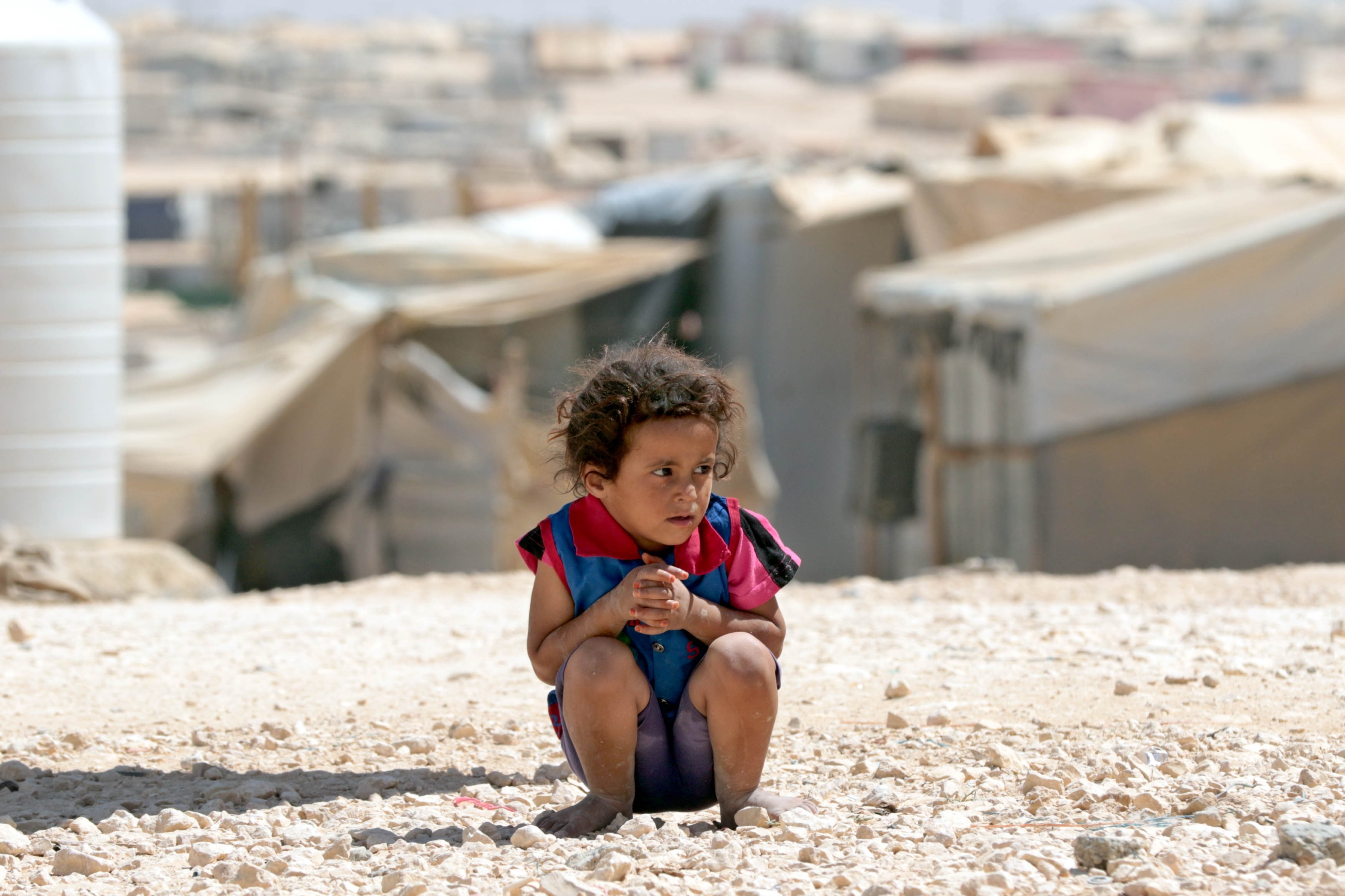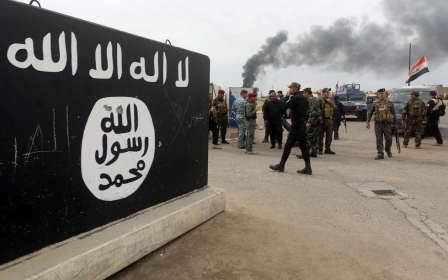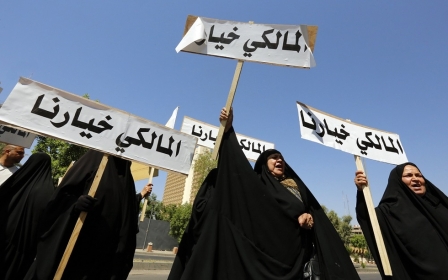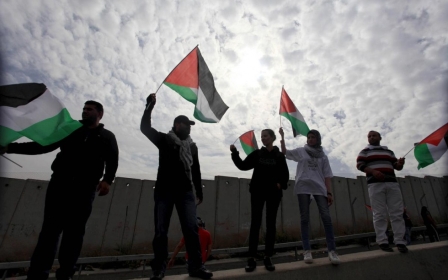Fleeing death, Iraqi refugees in Jordan wait for a new life in the West

AMMAN - Omar Abu Sitta waits outside the UN refugee processing centre, as he has done on many occasions since fleeing Mosul and the Islamic State group (IS) last year.
"I came here to hide from death, but I came to a psychological death," he says, clutching UN papers printed with the details of his name, age and status. "We want to move but always they tell us we have to wait. We need help but we can't get it. It's like a slow death."
“They take our problems, and they swallow them,” the 26-year-old says, pointing at the gated compound run by the UN's refugee commission, the UNHCR, in Amman. “Why would they make us suffer so much mentally when they know we are suffering already?”
Like Abu Sitta, Iman al-Zaidi, 49, has been stuck in Jordan since arriving last year with her 12-year-old son, Ali. "I just want to have a home. It's been a long time and a lot of people are waiting with me," the 49-year-old told Middle East Eye. "I've moved from the condition of fearing death to just waiting for death. Most of the money I get is from people who want to help me. Life here is really expensive."
Abu Sitta and Zaidi are but two of the 50,000 Iraqi refugees currently in Jordan, a country struggling to deal with huge influxes from conflict zones in Iraq and Syria. It has the second-highest rate of refugees per capita in the world - 87 for every 1,000 native Jordanian.
A huge backlog has formed as people wait for their Refugee Status Determination (RSD) interviews at the UNHCR, which refugees must sit to qualify for resettlement outside of Jordan.
Last month, the UNHCR stated that its RSD interviews would be cancelled for all but the most vulnerable Iraqi cases. Abu Sitta was among the several hundred Iraqis that protested against the news, as anger and despair spread among those stranded in Jordan.
That protest forced the UN staff to downgrade the cancellation to a temporary suspension while the agency refocused its efforts on the most vulnerable. But the confusion hasn’t helped the refugees’ growing despair over whether they will ever be relocated.
Stranded in Jordan
Iraqi refugees like Iman and Ali are trapped in a complicated and drawn-out process. When they arrive in Jordan, refugees register as asylum seekers with the UNHCR – a status that puts them under the protection of the UN’s refugee agency and qualifies them for some forms of assistance. After that, it’s a wait for a second interview to determine whether they’re formally refugees. If they’re successful in that, they wait again, for the USA or countries in Europe to accept them as residents.
"It’s very technical, it’s very labour intensive," Aoife McDonnell, a spokesperson for UNHCR, said. Qualifying for formal refugee status and thus resettlement involves a detailed process: several interviews with experts, who consider the credibility of an applicant's story in detail. "What you have to remember from the resettlement country’s perspective, is that they’re basically granting citizenship. So we have an obligation to ensure they are refugees," McDonnell said.
And despite the growing number of Iraqi refugees, the total who are resettled is falling: According to UNHCR statistics, about 6,000 Iraqi refugees were resettled to third countries in 2010, mostly to the United States. Last year, when more than 21,000 were registered as genuine refugees, the figure was 1,058.
And in the face of tight refugee quotas, the process of resettlement is tough. Though the official average waiting time for an RSD is currently 10 months for an Iraqi family, it can take many more years to actually find a third country to call home. Sometimes that does not happen at all.
"Resettlement is not a right. It’s something we can facilitate when countries come forward, and have given us quotas. When they don’t, there’s nothing we can do as UNHCR. We can’t just magic spaces, or passports for people," McDonnell says. "You can imagine, especially for young people who just want to start their lives, it’s especially hard - they’re in limbo."
Life in limbo
In eastern Amman’s Hashmi district – an area popular with refugees – many Iraqi families have been waiting in that limbo for years. Some have been rejected for resettlement, while others have jumped the hurdle of the RSD interview and are now waiting to be relocated.
Taher al-Aboosi, 21, left Baghdad for Damascus when he was 12, and arrived in Jordan five years later. His family are linguists: it was relatives’ translation work for the Americans that forced them to flee Iraq, and Taher speaks perfect English. But though he’s volunteered as a teacher, his refugee status means it's difficult to get paid work.
Amman, too, is an expensive city. Food, bills and rent for the small apartment Taher shares with his mother, father and brother has to be covered by the $275 the family receives a month from the UN.
“In general, you don’t have money at all. You get money for food, you get money for water, you get money for rent or electricity. You don’t have money to enjoy yourself, or to get out of the house or to buy things you like,” Taher explained.
The family’s difficulties are shared by most Iraqi refugees in Jordan. The cash assistance that Taher and his family qualify for is only provided to the most vulnerable families - some 12 percent of the total - and though many others manage by working illegally a lack of legal protections makes that fertile ground for exploitation. The UN does provide for essential healthcare, legal aid and education, although their budget has been depleted. But day to day life is still deeply insecure, and hopes for the future are even more so.
"They should just tell us whether we’re going to travel or not, whether we’re going to stay, what’s going to happen. Because here we’re just waiting, we don’t know for how long," he says. "Imagine you’re a refugee, you can’t travel, you can’t work, you can’t even study. You can’t do anything. You just wait. Maybe I can’t travel. Maybe I’m just going to stay here my entire life, for the rest of my life. Nobody knows.”
Wardrobe treasures
For the time being, Taher and his family are stuck, currently appealing against a decision by the International Organisation for Migration that denied them entry to the US. In their apartment in Hashmi, Taher points to his parent’s wedding photograph, a faded poster-sized print on the wall, taken decades earlier in Baghdad.
Tucked carefully away in the wardrobe next to it is a folder of documents: evidence of the family’s refugee and national status, their journey so far, and the links in the US where other family members are living.
They are the most important things the family own.
"They keep telling us that they’re waiting for a country to take us. When we call, when we try to talk to them, they just tell us to wait," Taher says. "I’m young, I can work. There’s so much I can do. Just let me loose!"
At the UNHCR offices in Amman’s Khlada district, there’s little in the way of easy answers for refugees like the Aboosi family. The agency says it’s committed to determining refugee status for all Iraqis within 10 months, while focusing on those who are identified as being particularly vulnerable and resettling them even more quickly. But that has no effect on the willingness of third countries to accept refugees.
And as life remains on hold, more and more decide that waiting is unbearable. Some have already joined the hundreds of thousands of refugees heading for Europe over sea and land; of those that remain, many say that the only thing preventing them making the dangerous journey is a lack of cash.
“It’s very obvious that the lack of legal routes into Europe is literally killing people. People who survived a very violent war, who have survived a tough time as asylum seekers, are now finding themselves deciding if they have enough money to pay for a life jacket,” McDonnell said. “And it’s because of this lack of hope.”
Middle East Eye propose une couverture et une analyse indépendantes et incomparables du Moyen-Orient, de l’Afrique du Nord et d’autres régions du monde. Pour en savoir plus sur la reprise de ce contenu et les frais qui s’appliquent, veuillez remplir ce formulaire [en anglais]. Pour en savoir plus sur MEE, cliquez ici [en anglais].




